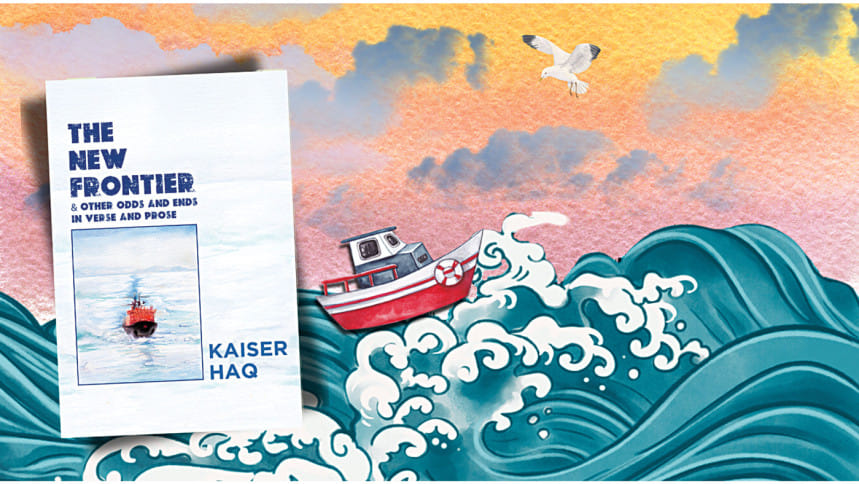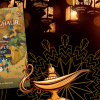Poetry for our times and a poet’s new frontier

Inevitably, Kaiser Haq's The New Frontier and Other Odds and Ends in Verse and Prose is about the poet, his poetic predilections, and situatedness at this time of human existence. In many ways it is typical of the verse we have come to expect from our leading poet in English for a long time now, but in other ways it articulates his present-day concerns in new and striking poetic measures.
Let me begin illustrating my assertions with the first poem of the collection. "Words" is about the "coming of a new poem" and the poet's exaltation at its arrival. What the Muse has told him is to "storm the ramparts/ of a rotten state/ letting in sweet light". Where is the "rotten state" though? And will Arnoldian "sweetness and light follow"? But the volume indicates something is "rotten" not only in the poet's own part of the world but planet earth itself.
Fast forward for confirmation to the title poem of the collection, "The New Frontier". Commissioned jointly by the University of Swansea and the Dhaka Literary Festival a few years ago to present poetry dealing with climate change, the longish poem has the poet remind us that the age of the "anthropocene" is nothing less than "obscene". The "world may be there for us to love", but much of it has already been "laid waste". Feelingly, Haq agonises on a loved one we seem to be bent on debasing/ destroying perversely and permanently. But though the poem is full of such "dire observations", as is at times this poet's hallmark, it is not "devoid of humor".
A number of the poems of 'The New Frontier and Other Odds and Ends in Verse and Prose' express as well the dark thoughts of the poet in old age
Those who have relished Haq's "Ode on the Lungi" will thus savour the wit and the naughtiness of his "Ode on a Sari". Indeed, the poet's characteristic wry, and at times even "black" humour nuance many of the poems of The New Frontier and Other Odds and Ends in Verse and Prose. The humour may even be self-subversive as in the autobiographical "Belated Mirror Stage". Here we find the poet musing at his own mirror image over the years, which would make him do anything and everything—play football, cultivate a sense of identity as someone "South Asian, Bengali and Muslim", study assiduously, do body-building, and even write poems! This "Covid-inspired poem" concludes with Haq moving from his Lacan-inspired take on the formation of subjectivity to an affirmation that takes off from Descartes' famous formulation and lands waveringly in the concluding lines, "I think therefore I am": "Yes:/ I'm still here,/ here I am still/ still I'm here still/ I am still here.
But there are sobering poems too—an example is the moving "Elegy Written in a Redbrick House", which not only evokes John Gray, but also echoes John Donne (clearly, Haq's consciousness is rooted in the great tradition of poetry in English) to pay tribute to architect Bashirul Huq, whose redbrick houses have become landmarks of our architecture. The poem that follows the one on the groundbreaking architect is also elegiac, for it remembers fondly the pioneering Bangladeshi publisher of high quality books, Mohiudin Ahmed. It is thus that the poem ends so eloquently and stirringly, "In the Book of Books he stands/ illuminated under 'Acknowledgments' ".
A number of the poems of The New Frontier and Other Odds and Ends in Verse and Prose express as well the dark thoughts of the poet in old age. Indeed, the poem titled "A Late Poem" muses on old age and is nostalgic about a time when verse would come to him "like beans sprouts" and one could, so to speak, lead life to the lees, indulging in the kind of pleasures that increasingly would seem "irrevocable". Always allusive, Haq ends this brooding, dark poem with two lines that echo no less than two Shakespearean formulations from his "dark" tragedies, "Blankness/ is all" ("Ripeness is all" and "Readiness is all"). Apparently, the recent pandemic and rampant viruses have been reinforcing his pessimistic thoughts. Thus "2020-nKarV"—a poem on Covid-19's impact—wonders if the virus is a sign that "entropy rules after this/ universe there may not be another". Haq's dengue poem, "Ka Dinga Pepo" also mediates on that other "wicked virus". This is poetry coming out of pain, or as the poem so uniquely articulates, "poetry in pain"!
There is then the kind of variety in Haq's latest collection of verse that will reinforce his reputation for coming up with thoughtful, humorous, and distinctive volumes of verse every now and then. His readers will keep hoping that he will desist from taking the "happy farewell" to poetry that he was intending to take through his 1994 volume, and will continue to gift us his inimitably flavoured poetry in the years ahead. "Making a Case", a poem full of the kind of droll moments that liven up Haq's poetry, ironically explains why he has recently opted for writing verse using the "lower case" as a "postcolonial" gesture of protest in Caliban's vein, knowing that what matters for the poet, ultimately is the hope that "maybe they'll find a way" into the reader's "heart". One hopes that Haq will keep on experimenting stylistically, for one is encouraged by the fact that the poem that follows "Making a Case" is "What Good is a Poem", which suggests wryly that a poet like him will keep on striving to write poems even "in long tried syllables" in the hope of breathing "old truths" compulsively.
In fact, "The Emperor's New Clothes", the poem Kaiser Haq has chosen to conclude The New Frontier and Other Odds and Ends in Verse and Prose, is in prose. It is his whimsical take on "The Emperor's New Clothes". Hans Christian Andersen's delightful folktale becomes as a result, "postcolonially" transferred to Dhaka. After all, Haq's ancestral home is Rupganj, home of the fabled Muslin, a cotton fabric so transparent seeming that it appears to the poet that Andersen's apparently "nanga" emperor might have worn it. Haq, we may conclude, is a very Bangladeshi poet writing in English uniquely, in a manner that is quite postmodern and always captivating. May he keep weaving poetry out of his Bangladeshi location in a manner that will continue to earn him the admiration of connoisseurs of poetry everywhere!
Fakrul Alam is Bangabandhu Chair Professor, University of Dhaka.

 For all latest news, follow The Daily Star's Google News channel.
For all latest news, follow The Daily Star's Google News channel. 









Comments